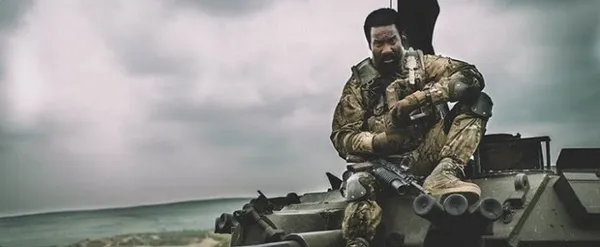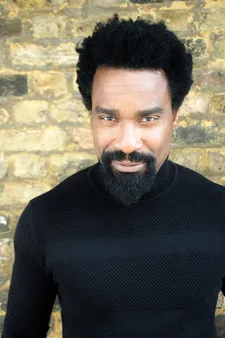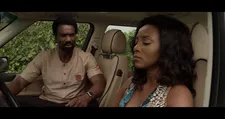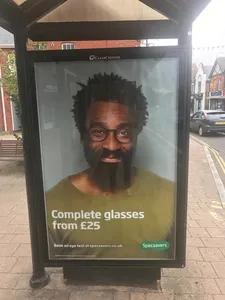 |
| Redcon-1 |
He was once one of the world's best known models, he's worked with the likes of Donnie Yen and Dennis Hopper and he's won multiple awards for his acting. Now Oris Erhuero is the face of Specsavers and attracting acclaim for his work as a producer. He can be seen in cinemas around the country as the lead in Redcon-1. When a got a gap in his shooting schedule we chatted about his complex career path and he told me how he got involved with Chee Kong-Cheung's epically ambitious zombie action film.
“One of the producers, Ioanna [Karavela], on her way to the Berlin Film Festival, saw my film The Cursed Ones – it won the African Best Director award and I won the Screen Nation award. I was actually the lead of that film, which is on Flix Premiere, and I have a film called Road To Yesterday, I’m the lead in that and it’s on Netflix. And she realised I have actually been around the action world myself, in my career.
 |
| Oris Erhuero |
“I started from an action perspective on a TV series which I was on for many years called The Adventures Of Sinbad, and I worked with Donnie Yen on Highlander 4 and the list goes on. Based on that she introduced me to Chee and had me take a look at the script, and I thought it was one of the most beautiful scripts I have read in a long time but very ambitious for what they were trying to do it for. I gave him a handshake, looked him the eye and said ‘You know what? If you believe in this and you’re brave enough to pull this off, so am I. Count me in.’
“So that was it. I just followed him . He’d had the script for a very long time from what I heard and many people were afraid to touch it because they wanted so much money to do the film, and they were even trying to buy it off him. His story was just so touching that I said ‘Look, I’m going to ride this thing with you and I’m going to give it everything I can as an actor, to make this happen.’
“I’ve also produce films myself so I know the pain and I know what people have to go through. As an actor I’m very fortunate to have experienced that feeling of people looking at you like ‘Good luck!’ you know, or ‘This is way too ambitious, there’s no way in Hell you’re going to pull this off.’ And it just makes me laugh when I just politely say ‘Thank you very much. I’ll show you.’ And that’s what Chee did.” He laughs.
It was a great experience to be part of the film, he says. “I found a family who thought the same way I think: just get on with it!”
Chee told me that he was concerned about finding actors who could cope with what was a very physical role, I note. I ask Oris if he found it a challenge or if he was still in shape from his Sinbad years.
“When I looked at this film it was kind of serendipity – it felt like it was meant to be. I studied martial arts and I’ve always held onto those things over the years. I’ve never let them go because you just never know when a Redcon-1 could come walking into your life. So the only aspect I found different and very tough was the military training.”
All the actors playing soldiers went through an intensive military training course before the shoot began.
 |
| The Cursed Ones |
“Chee wanted to make sure that when you watch us as actors you couldn’t tell the difference with us and guys going into Fallujah,” Oris says. “You couldn’t tell the difference with us and guys going to Afghanistan. So he pretty much surrounded us with guys who have experience – you know, the SAS, Special Forces, the Marines – and buy the end of that rigorous training the guys who trained us honestly said they couldn’t tell the difference. At one point the other ex-soldiers who stopped by the set was asking what regiment were we from. I thought that was the highest honour I’ve ever seen said about actors.”
Friends with military pasts said similar things, he says excitedly, and people said that they thought the film was like a cross between 28 Days Later, The Raid and Fury. “When they added Fury to that I said ‘Whoa!’ If you look at the film Fury, it was all soldiers and how they fought for their lives. So to get that kind of compliment from mega producers, you know, they also said some incredible things, and these guys are in their seventies. They’ve been producing films forever... We can walk away feeling chuffed about ourselves and, again, I want to thank Chee for that.”
Did the military training help him to connect with other aspects of his character in the film?
“Absolutely! Another thing: I went through military school as a kid. If I wasn’t an actor I would have desperately wanted to join the armed forces, but my mum said over her dead body. So I’m very glad that, as an actor, I got to play such a character onscreen... That training that Chee had people give us really helped me channel my character. I was taking on stories of men who lost everything, you know? Men who went to war, their wives were pregnant, and they never came back. And the fear of that helped me explore different avenues. I felt also that it was my job, the moment I had that uniform on, to respect it.”
 |
| Road To Yesterday |
If he was interested in acting and interested in the armed forces, how did he end up in modelling? Was it something he always saw as a route acting?
“Yes. It was my route. I moved out to the ‘States at a very young age – I was about 16 – and a lot of casting directors said to me ‘The times have changed.’ And to keep my sanity and enjoy what I was doing, they said to explore other avenues along the way. Do modelling, do commercials, do things where you can, step by step, understand what it’s like to be in front of a camera. It’s one thing to be a stage actor, to study it, but it’s another thing when you have to perform and simultaneously, with the camera, portray a character. So I took that advice and kept it in my heart that acting and producing and writing would be my end goal.
“I think it’s very, very important as a young actor to take opportunities and expand your horizons. Commercials are pretty much a high end movie in three minutes, so most directors today will tell you that they would rather do commercials and shoot models all day because they make more money. For me it’s the opposite. I mean, that’s great but I want something where I can breathe and I can tell stories and go deeper.”
He notes that most actors today are now doing big campaign ads, the sort of thing that he was doing 26 or 27 years ago, and he laughs. “You know, back then you got a lot of stigma for it!” Many people struggle to do that kind of work alongside film acting and make both work, he says, so he feels very lucky that he can.
 |
| Oris as the face of Specsavers |
I ask if going into production was, for him, partly about getting good roles, or if it was something he really wanted to do anyway.
“It gives you a licence, it gives you a guarantee,” he responds. “Not only that but I’ve always believed that, as an artist, you are responsible for your life. You are responsible for how you drive your career. I’m really getting sick and tired of actors complaining that they’re not getting enough roles, they’re not getting the right roles, stuff like that. No. It’s not your company. We are in an era now where it’s a lot easier to shoot films but you’re got to be smart enough to do it right. I’m a man who likes to pay attention to the latest technology and find the latest way to make things better. And I’ve also produced films.”
He says that he thinks the experience of doing so has made him sharper as an actor.
“You see all these actors and actresses who are developing their own films, they’re all going into great festivals. What better person to be directed by than an actor or an actress who owns their own production company? They understand writing, they understand scripts. Especially if they went through the same school I went through, which was being on a TV series for so long. You’re constantly seeing scripts. You’re constantly working wit different cameras, different technology, and I came from an era where we were using 35mm.”
He stresses that what he thinks artists should be doing is pursuing the projects that really interest them, even if that requires overcoming fear.
“That’s how I feel. I want to try something real. I want to try something that, sometimes, the big studios may not believe in but in my heart I know there’s a place for it. And as actors we travel and we see the world, we get into every corner and crevice, we know what people are interested in. It’s not my job to be an actor and to be untouchable, to be someone that people can’t even relate to. It’s my job to go to the desert, it’s my job to go to Morocco, to see the world and take ideas and learn, So being an actor is a full time job. You’re dealing with love, life, heartbreaks and everything. So what better person to tell a story?”
 |
| "We are in an era now where it’s a lot easier to shoot films but you’re got to be smart enough to do it right" |
So what about his remaining ambitions? What does the future hold?
“I have three films that I was working on simultaneously while filming Redcon-1, considering that Redcon-1 was shot over 12 weeks over the span of almost two years... I’m working now on my own personal production stuff. I’m taking it one step at a time and paying attention to where I’m at.
“My secret hidden agenda is for a lot of the younger generation in England to really get on the bandwagon and really go the independent route and push British independent film. That would be my ultimate goal, to advocate for that so we can go out into the world, pool characters, pool ideas and bring it home and use our talent right here. Hollywood is a state of mind and that’s something I want the next generation to understand because as easy as it is to make films it’s going to be also very, very difficult because all of a sudden everyone’s going to thing they’re a Chee, which is not true. it takes a lot of courage and it takes a lot of studying. It takes a lot of patience. You can’t just go and put a film out there are expect the world to come.
“As I’m going along then I’m also passing that to the next filmmaker and bringing them along the line and being a mentor, and that’s part of my next journey.”





















